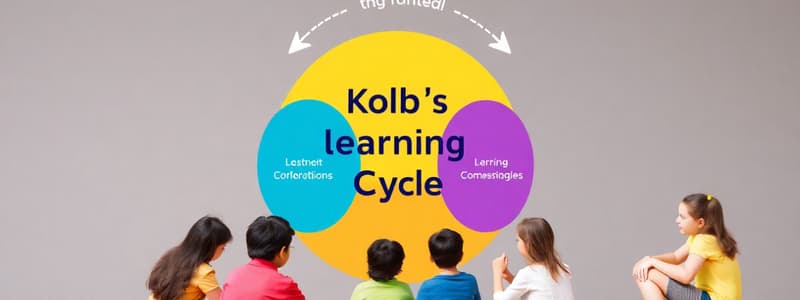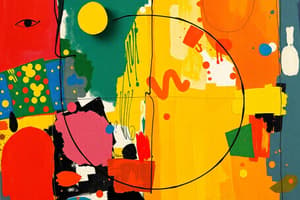Podcast
Questions and Answers
What defines the Concrete Experience stage in Kolb's learning cycle?
What defines the Concrete Experience stage in Kolb's learning cycle?
- Conducting hands-on activities or experiences (correct)
- Reflecting on past experiences
- Reviewing previous theories and concepts
- Formulating new hypotheses
In the Reflective Observation stage, what do learners primarily focus on?
In the Reflective Observation stage, what do learners primarily focus on?
- Conducting experiments to test theories
- Analyzing and reviewing their previous experiences (correct)
- Applying new theories in different contexts
- Generating new ideas based on abstract concepts
What characterizes the Abstract Conceptualization stage?
What characterizes the Abstract Conceptualization stage?
- Carrying out hands-on experiments
- Formulating theories based on reflections (correct)
- Evaluating past experiences for improvement
- Imagining future possibilities and ideas
Which learning style is described as benefiting from practical applications and problem-solving?
Which learning style is described as benefiting from practical applications and problem-solving?
Which learning style is best at generating new ideas and seeing things from different perspectives?
Which learning style is best at generating new ideas and seeing things from different perspectives?
What is a characteristic of Assimilating learners?
What is a characteristic of Assimilating learners?
What approach do Accommodating learners typically utilize when solving problems?
What approach do Accommodating learners typically utilize when solving problems?
Which stage of the Experiential Learning Cycle involves testing new theories or concepts?
Which stage of the Experiential Learning Cycle involves testing new theories or concepts?
What is one key benefit of experiential learning in education?
What is one key benefit of experiential learning in education?
Which of the following best describes the importance of reflection in experiential learning?
Which of the following best describes the importance of reflection in experiential learning?
What challenge is commonly associated with implementing experiential learning?
What challenge is commonly associated with implementing experiential learning?
According to Situated Learning Theory, how is learning most effectively acquired?
According to Situated Learning Theory, how is learning most effectively acquired?
What is a characteristic of 'communities of practice' as described in Situated Learning Theory?
What is a characteristic of 'communities of practice' as described in Situated Learning Theory?
What role does critical thinking play in experiential learning?
What role does critical thinking play in experiential learning?
How can experiential learning affect student engagement?
How can experiential learning affect student engagement?
Which of the following statements about applying knowledge in experiential learning is true?
Which of the following statements about applying knowledge in experiential learning is true?
Flashcards are hidden until you start studying
Study Notes
Kolb's Experiential Learning Cycle
- Four-stage cycle: Concrete Experience (CE), Reflective Observation (RO), Abstract Conceptualization (AC), Active Experimentation (AE).
- CE: Direct experience or hands-on activity; encountering new situations. Example: Lab experiment.
- RO: Reflecting on the experience; analyzing feelings and observations. Example: Reviewing lab notes.
- AC: Forming theories and concepts based on reflections; integrating observations into new ideas. Example: Developing a new hypothesis.
- AE: Applying new concepts through testing and further experimentation. Example: Designing a new experiment.
Kolb's Learning Styles
- Converging: Problem-solving focused; practical application of knowledge. Example: Applying theory to real-world problems.
- Diverging: Imaginative and open-minded; excels in brainstorming and seeing multiple perspectives. Example: Generating new ideas.
- Assimilating: Prefers abstract concepts and theories; excels in organizing and analyzing information. Example: Integrating theories before application.
- Accommodating: Hands-on and intuitive; uses trial and error. Example: Learning through experimentation and accepting uncertainty.
Applications of Experiential Learning in Education
- Encourages active participation through hands-on activities and real-world problems.
- Promotes reflection to deepen understanding and connect theory to practice.
- Fosters critical thinking by developing independent theories and solutions.
- Applies knowledge by testing and using new knowledge, improving retention.
Benefits of Experiential Learning
- Deeper learning and longer information retention.
- Improved problem-solving skills through real-world application.
- Enhanced student engagement compared to passive learning.
- Increased self-awareness through reflection and application.
Challenges of Experiential Learning
- Can be resource-intensive, requiring time and effort.
- Requires skilled facilitation to guide students and ensure meaningful reflection.
Situated Learning Theory (Lave & Wenger)
- Learning is context-dependent; best acquired through real-life activities within specific social and cultural contexts.
Key Concepts of Situated Learning
- Learning in Context: Knowledge gained through authentic tasks reflecting practical application. Example: Learning to cook by actually preparing meals.
- Communities of Practice: Learning occurs through participation in groups sharing common interests; collective learning through interaction.
Studying That Suits You
Use AI to generate personalized quizzes and flashcards to suit your learning preferences.




